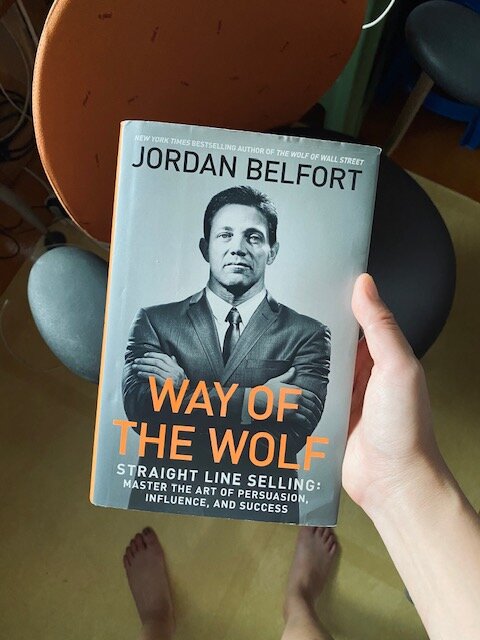Way of The Wolf by Jordan Belfort
Wolf of Wall Street is one of my favorite movies. Mainly because I’m a big Leo fan 😍
Crazy enough, it’s based on a true story. Jordan Belfort’s life. I do not condone what he did to innocent people and how he ruined their lives. No not at all.
I am in the belief of reading books we agree with and disagree with because it helps you learn. In “Way of the Wolf,” he shares some of his sales advice, frameworks and mindsets.
Notes
Two Types of Certainty
Logical Certainty
Does the idea or thesis you’ve presented make sense?
Does your product or service truly fill their needs?
Is it priced fairly compared to the competition?
Does the cost-benefit ratio make it an unequivocally great deal?Emotional Certainty
This has to do with painting your prospect a picture of the future where they’ve bought your product
Future pacing: you’re essentially playing out the post-buying movie in the best fashion possible— allowing that person to experience your product’s amazing benefits right now, along with the positive feelings they create.
They’re both important. People don’t buy on logic; they buy on emotion and then justify their decisions with logic
Common objections were nothing more than smoke screens for what was really holding a prospect back, which was a lack of certainty
Gather intelligence— which goes far beyond trying to figure out if your prospect is financially qualified or not. Gathering intelligence means:
1st, identifying their needs
2nd, identifying any of their core beliefs they have that could impact the sale (ie. not trusting salespeople in general)
3rd, find out about any past experiences they’ve had with similar products both good and bad and how they feel about the salespeople they’ve bought from in the past
4th, you want to identify with their values — meaning, what things are most important to them?
5th, you want to identify their financial standards
6th, where their pain lies — what’s keep them up at night?
You must take immediate control of the sale
You must engage in massive intelligence gathering, while simultaneously building massive rapport with your prospect
Take time to uncover precisely what your prospect’s pain is and where it comes from. Then you can position your product as a remedy for their pain and then verbally paint a picture for them in the future
In the first 4 seconds of an encounter you want to be perceived as: sharp as a tack, enthusiastic as hell, and an expert in your field
Being enthusiastic as hell = I need to genuinely believe in that value before I sell a product or service, and then I’ll describe it passionately. This is what allows me to act enthusiastically in any sales situation
Being an expert in your field = I convince the prospect that I am highly competent, ultraknowledgable professional by coming off as a world class expert in my field right out of the gate
Human communication = Tonality (45%) + Body language (45%) + Words (10%)
State management: You have the ability to choose the precise direction of your focus and based on that choice, you will fall into a state that’s congruent with what you’ve chosen to focus on.
Absolute certainty: your voice takes a firmer, more definitive tone
Utter sincerity: it’s a velvety smooth tone that’s so humble and so nonthreatening, that it sounds almost apologetic in nature but of course there’s no apology being given
The reasonable man: “If you have 60 seconds, I’d like to share an idea with you, You got a minute?” Those last 3 words — got a minute? — are when you applying the reasonable man tone, which entailed you raising your voice up at the end of a sentence to imply the reasonableness of your statement
The first question you’re going to ask them, no matter what objection they hit you with is: “Does this idea make sense to you? Do you like the idea?” You do it in your hypothetical, money-aside tone. In essence, you’ve made the whole thing an academic exercise, which totally disarms them
Always ask for permission to ask questions so it comes off as non-confrontational
“John, just a couple of quick question so I don’t waste your time”
“John, let me just ask you a couple questions to I can best serve you.”
“John, let me ask you just a couple quick questions so I can best see what your needs are.”
You want to amplify their pain by asking them a series of follow-up questions that actually future pace it — forcing them to experience the reality of being in even greater pain at some point down the road if they don’t take action now to resolve it
Rapport is not constant; it goes up and down throughout the entire sale, depending on 2 things
1) how your prospect thinks and feels about the last point you made
2) his belief as to whether or not you are on the same page as him in regard to that point
At the end of the day, it’s these 3 distinctions that serve as the very foundation to which all rapport is built:
1) he cares about me
2) he understands me
3) he feels my pain
Charisma has 3 components
1) effective use of tonality
2) targeted use of body language
3) not saying stupid shit
Strategic preparation: it’s an attitude that borders over-preparation. In short, the philosophy of strategic preparation is based on anticipating everything that might possible coming up in a sale and having the best possible response to it prepared in advance
You want to make sure that you make your prospect talk about their pain
